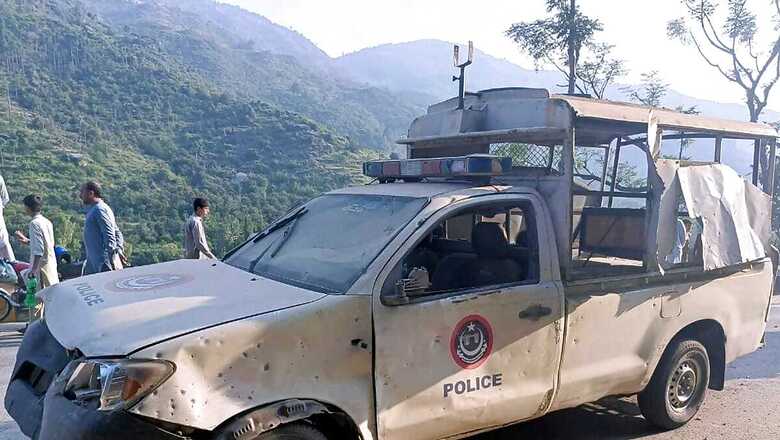
views
On September 22, 2024, a diplomatic convoy en route from Pakistan’s Khyber Pakhtunkhwa to Islamabad was attacked, resulting in the fatality of a police officer. Media reports revealed that the convoy was carrying diplomatic representatives of 12 countries. They were returning from Swat Valley, where they had participated in a local chamber of commerce meeting, when this attack took place. Although such incidents are commonplace in Pakistan, the specific timing and nature of this attack raise critical questions about both its authenticity, motivations of perpetrators and potential implications. No terrorist group has claimed this attack as of now.
This incident warrants a thorough analysis through two key dimensions. First, the attack unfolds in the backdrop of significant political and security upheaval within Khyber Pakhtunkhwa (KPK), a region predominantly inhabited by the Pashtun ethnic group. Aside from the continued heavy political repression by the military establishment and its civilian front of the Shehbaz Sharif government, the province has witnessed heightened tensions between the local police force and the Pakistan Army in recent months. These tensions have manifested in an unprecedented public confrontation between the two key components of the state’s security apparatus.
Notably, in the Lakki Marwat district of the province, hundreds of police officers engaged in a four-day strike to protest the Pakistan Army’s persistent interference and encroachment upon their jurisdiction, demanding the removal of military’s footprints from the civilian areas. They further accused the military of fostering terrorism by not only facilitating the growth of extremist elements but also securing their release from police custody through coercive means, and, as such, demanded that the mandate for combating terrorism and extremism should be transferred entirely to the KPK police force.
This bold demonstration of defiance by the police officers in Lakki Marwat galvanised similar protests in neighbouring districts, such as Bannu and Tank, thereby exerting significant pressure on the military establishment. Consequently, the military was compelled to concede to certain police demands, including its partial withdrawal from civilian territories. However, it remains ambiguous whether the Pakistan Army has fully relinquished control over counter-insurgency operations in the region, as the question of who will spearhead these efforts persists amidst mounting calls for enhanced police autonomy from across the province. This strain in the security establishment highlights how the Pakistan Army’s commitment to combat terrorism is increasingly being scrutinised for its alleged complicity in perpetuating instability in the first place.
Given the entrenched dominance of the Pakistan Army over the country’s political and security apparatus, it remains highly improbable that the military will readily relinquish its role or concede operational space to local police forces. As such, in the latest Swat Valley attack, the situation is further complicated by the conspicuous denial by major terrorist outfits, such as Tehreek-e-Taliban Pakistan (TTP) and the Islamic State, of their role in the attack. Both of these groups have a history of swiftly owning their role in such attacks. In particular, the TTP—widely known for its penchant for publicly claiming attacks—has gone to great lengths to explicitly deny any involvement in this incident. This atypical disavowal raises suspicions regarding the real perpetrators of the attack, leading to the plausible hypothesis that elements within Pakistan’s military intelligence agencies may have orchestrated the incident as a strategic diversion.
As such, an operation like this would serve to shift attention away from the growing calls for the Pakistan Army’ withdrawal from civilian areas across Khyber Pakhtunkhwa, including Swat Valley, and for the empowerment of the local police to lead counter-insurgency efforts. Moreover, if the attack had indeed been the work of militant factions, it does not fit into their latest modus operandi of using such occasions to demonstrate their acquired lethality. This argument is further substantiated by reports from the Pakistani media, which indicated that the police’s bomb disposal unit had thoroughly sanitised the convoy’s route, clearing it for movement.
The fact that such precautions were taken, yet the attack still occurred, lends credence to the hypothesis that the operation could involve state actors with knowledge of or access to internal security arrangements. This implicates state-affiliated intelligence agencies who might have orchestrated this act of violence to preserve military dominance over the province’s security landscape.
In the alternative scenario, if this attack was indeed not an inside job of the military intelligence agencies, it represents a massive security breach, underscoring the dysfunction and disarray between federal and provincial authorities. Moreover, it also signifies a colossal failure of Pakistan’s security establishment to protect both local populations and foreign dignitaries besides highlighting the broader systemic malaise and vulnerabilities within the country’s security framework. As noted by Abdullah Khan, a prominent Pakistani analyst, the fact that the diplomatic convoy’s route was privy only to the security establishment raises the likelihood of an internal information leak, further exacerbating suspicions of compromised security protocols.
This breach occurs at a particularly sensitive time, as Pakistan’s government is running around to convince foreign businesses and governments to invest in the country, with Prime Minister Shehbaz Sharif on an overseas tour to attend the UN General Assembly and meet various foreign leaders. In this context, the military establishment’s inability to stabilise the country, despite its dominant role in Pakistan’s internal security, signals to the international community that the nation remains perilously unsafe for any investments. As this persistent insecurity not only threatens the lives of local citizens but also renders any foreign presence highly vulnerable to violence, it further erodes confidence in Pakistan as a stable destination for international engagement and investment.
In a nutshell, given the unfolding police-Army strain in KPK and heightened political tensions, the role of military intelligence agencies in perpetuating this attack cannot be discounted as it helps suppress the voices seeking its withdrawal and maintain its security grip.
The writer is an author and columnist and has written several books. His X handle is @ArunAnandLive. Views expressed in the above piece are personal and solely those of the author. They do not necessarily reflect News18’s views.




















Comments
0 comment